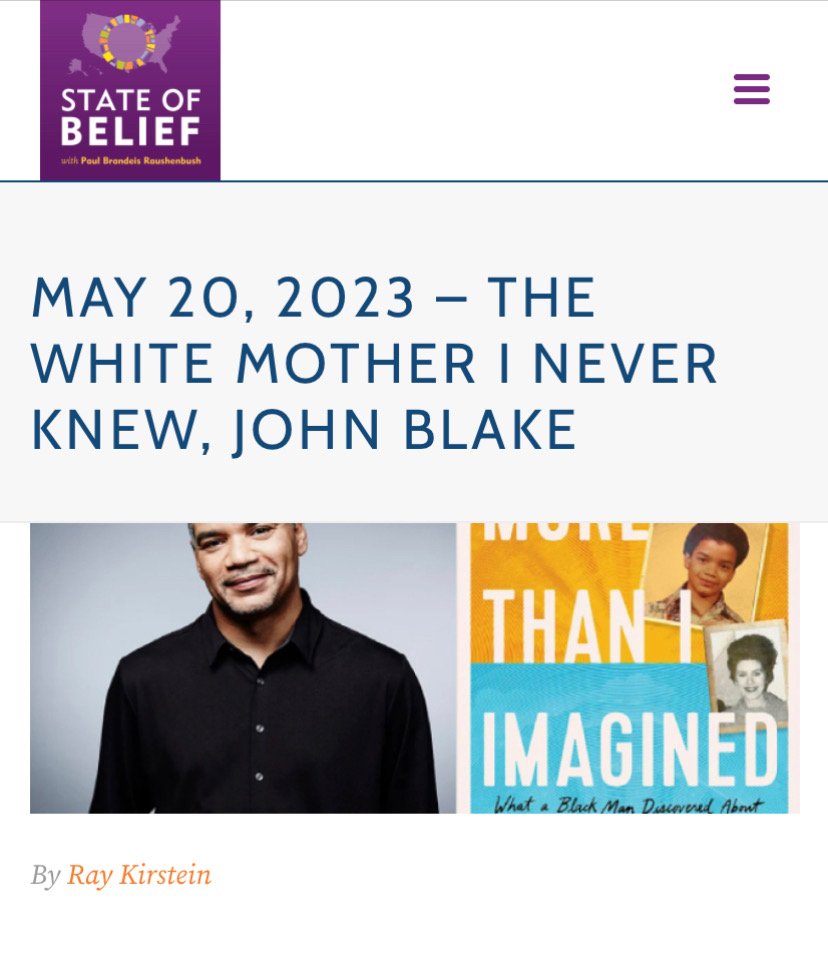“My memoir is about faith and race, but there are additional layers exploring mental illness, something called “radical integration,” a social science concept called “contact theory,” and even the paranormal. At its essence, though, it’s a story about a boy trying to find his mother, and his place in the world. Below are some of my reflections about the book.
“My father ... didn’t think I could handle [the truth] until I became a young man.”
“It’s only 4.1 miles.
That’s the scant physical distance between the West Baltimore home where John Blake’s Black father lived, and the Wilkens Avenue house where his white Irish Catholic mother grew up. But the actual space between those worlds is yawning, a gulf defined by race. It became the foundation for a central missing piece of Blake’s identity, and the plot of his gorgeously heartbreaking recent memoir.”
“I told the story of my mother through a book, but I also shared it onstage before a crowd at the Orpheum Theater in downtown Los Angeles. I was invited to the Orpheum by the Snap Judgment Spooked podcast. I told a story about something that I saw one night when I was a boy—and how it set off a chain of events that would change my life.”
“…And so my story began with a mystery. I was born in West Baltimore in this all-Black inner-city neighborhood, but I had a white mother and a Black father. But my white mother disappeared from my life not long after I was born, and no one told me why she disappeared. So I grew up not knowing who she was, whether she was alive. I didn’t even know what she looked like. All I was told was this: that your mother’s name is Shirley, she’s white, and her family hates black people...”
A conversation with CNN’s John Blake - CNN
“I think we have felt that if we have enough protests, if we show enough shocking videos, if we give enough information to White people like “read this book on White fragility,” that that will change White people. White moral outrages, though, tends to fade as the news cycle moves on, and human beings have ingenious ways of shielding themselves from facts that don’t conform to their preexisting beliefs.
That’s why I tell people: Facts don’t change people. Relationships do.”
“I’ve been covering racial divisions in this country for 25 years and the racial climate in this country is as bad as I’ve ever seen. I think so many people have been deflated by the White backlash that greeted the election of Obama; the election of Trump, the neo-Nazi rally in Charlottesville and the January 6 insurrection. Add to that the steady stream of videos capturing the murder of unarmed Black and brown people. I used to think as a reporter, why can’t we tell more stories about race that give people hope? Then I realized that I was living such a story, and it was worth sharing.”
The White Mother I Never Knew, John Blake - State of Belief Podcast
“I tell people that if we’re going to survive as a multiracial, multireligious democracy, those who believe in that vision of America, we have to become better storytellers. Stories reach people in a way that facts, studies, and information – it doesn’t go there. And often the only stories we talk about or tell about race in this country are stories about failure, how we can’t get past racism.”
“I glanced over into the corner of my bedroom and I saw an elderly white man who was half walking, half floating through our bedroom. At first I thought it was a dream and I rubbed my eyes, but he just stayed there and I watched him. When I woke up the next morning I talked to my younger brother Patrick and said, "Did you see somebody last night?" And he said, "Yeah."




